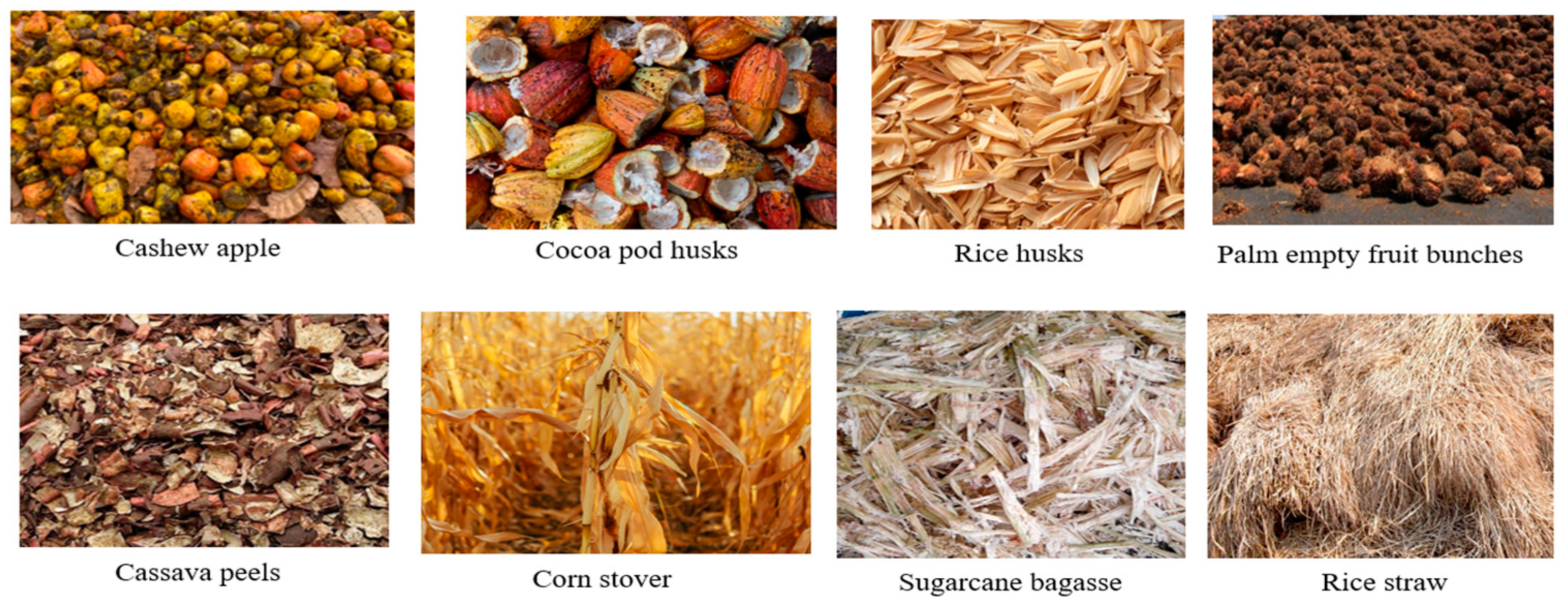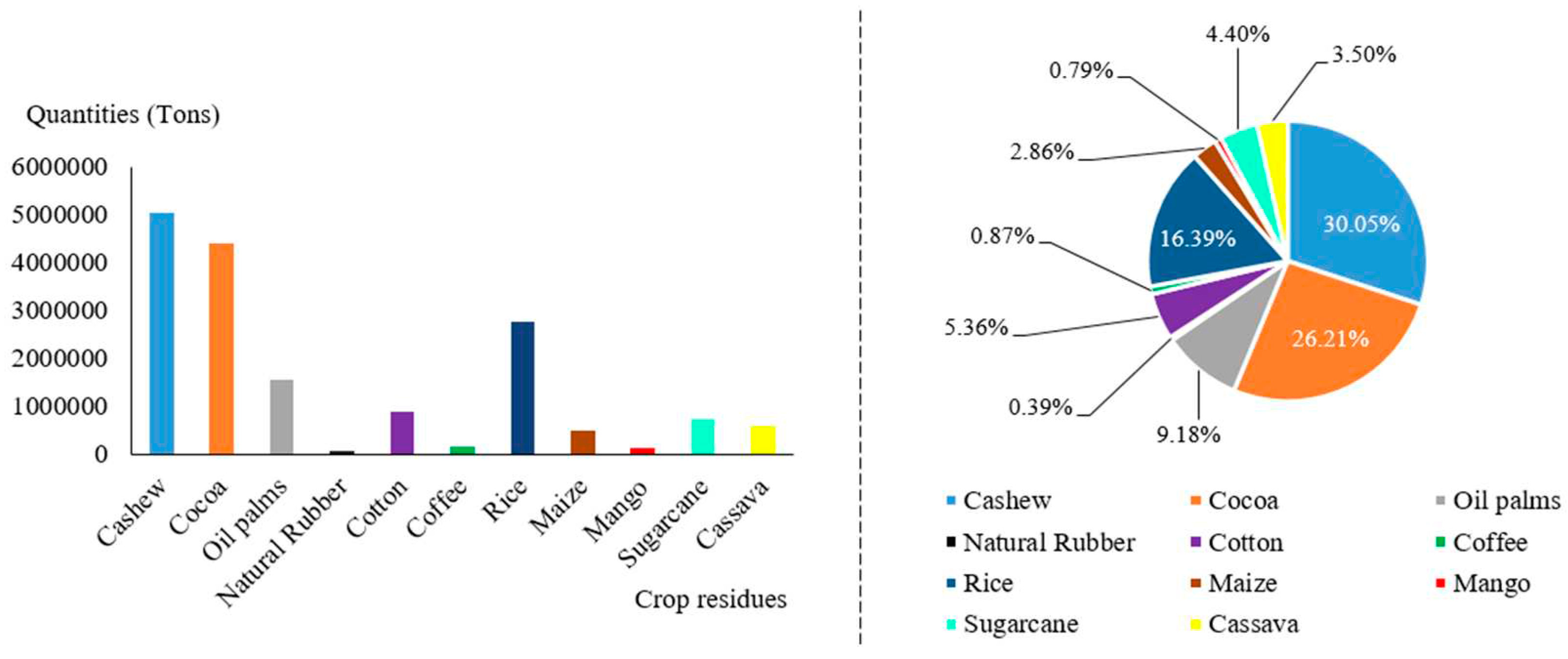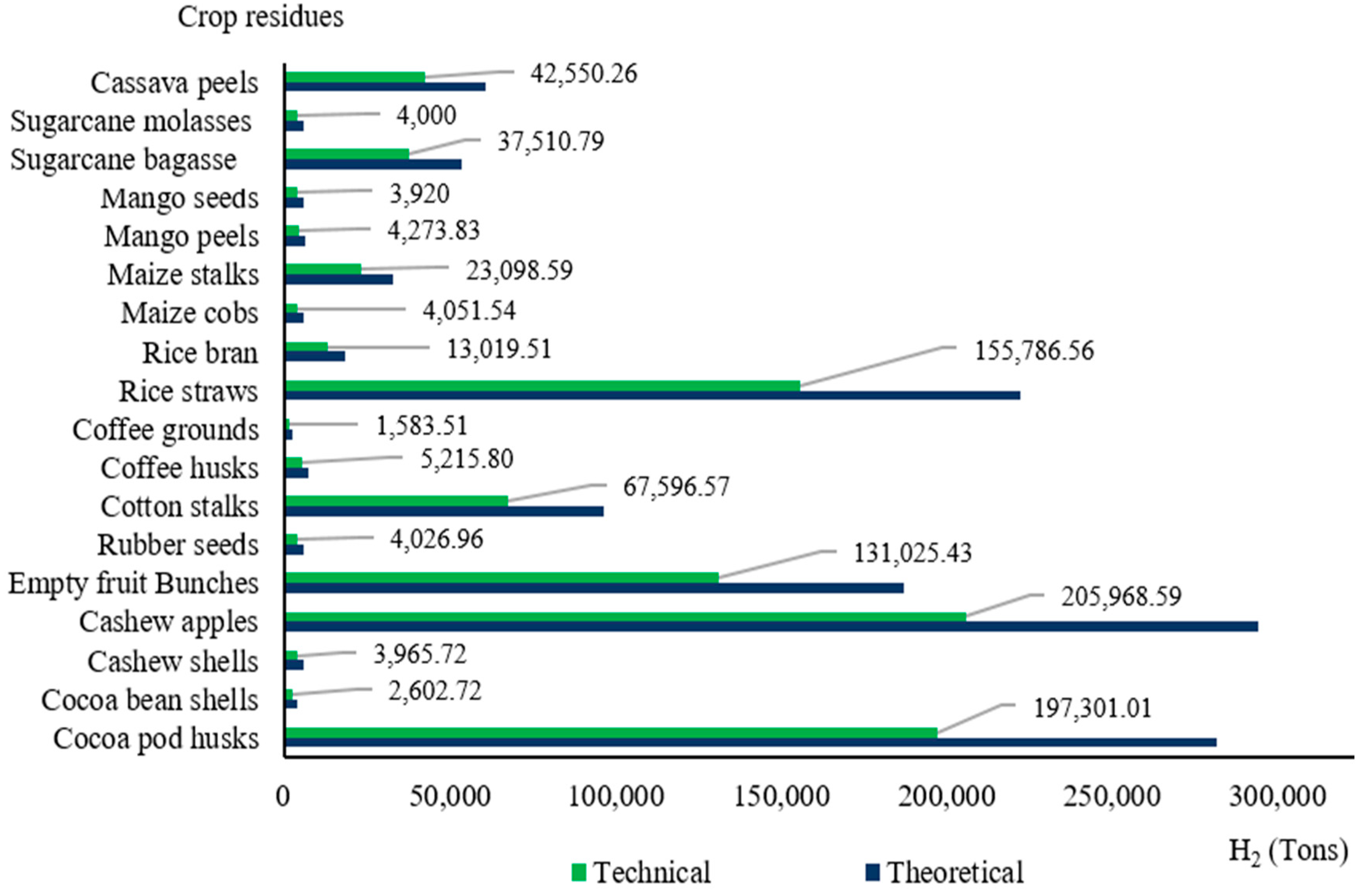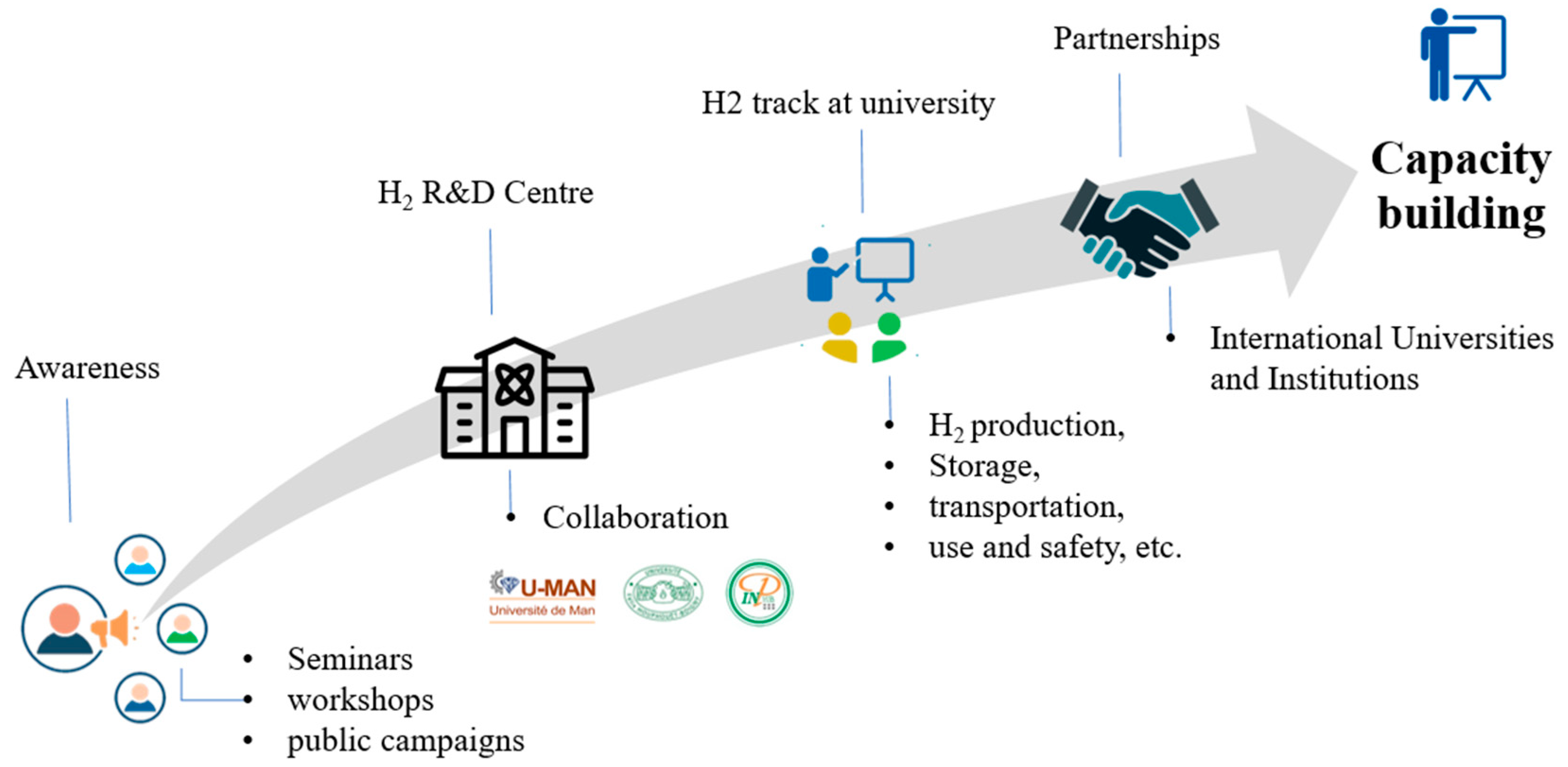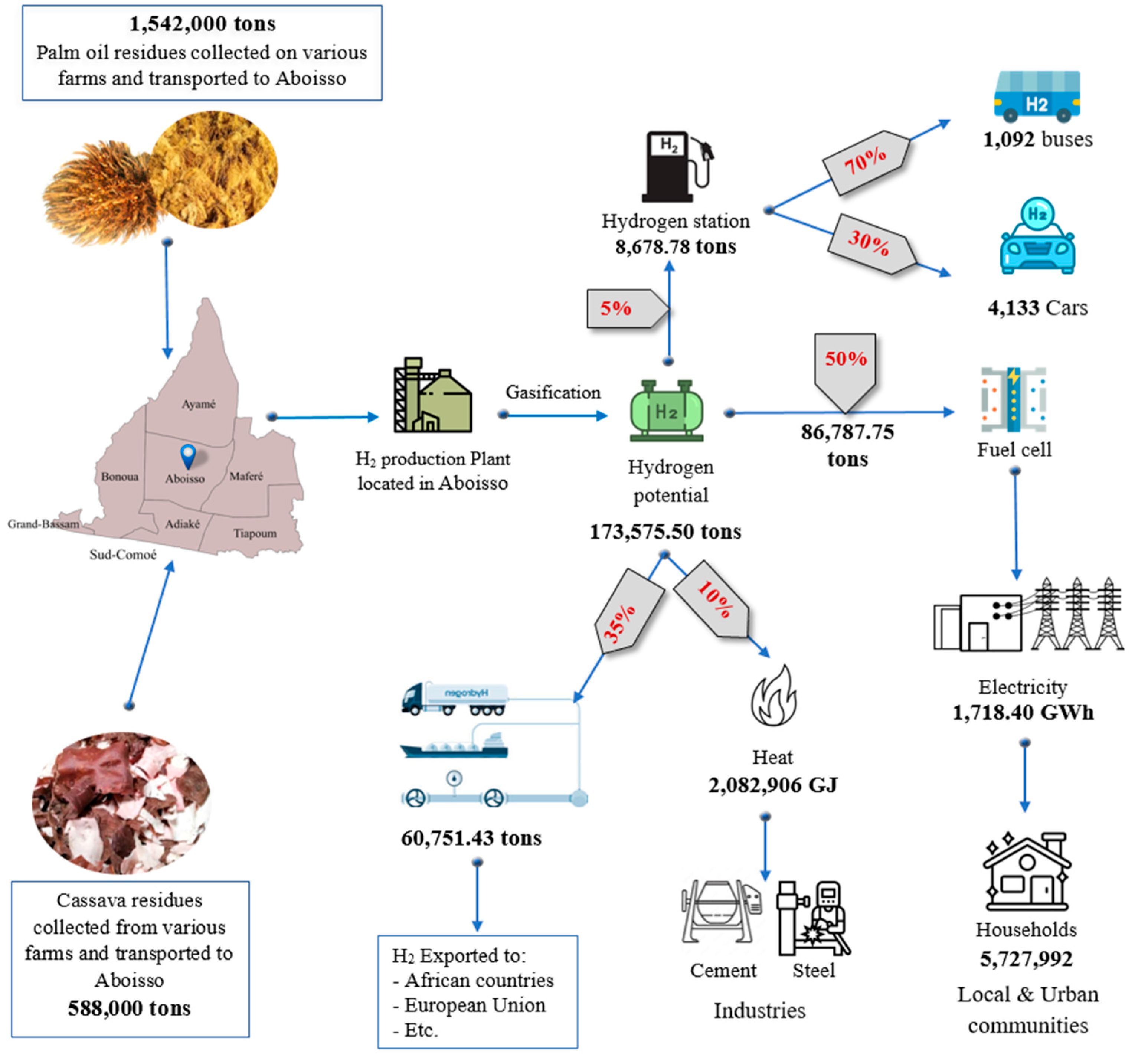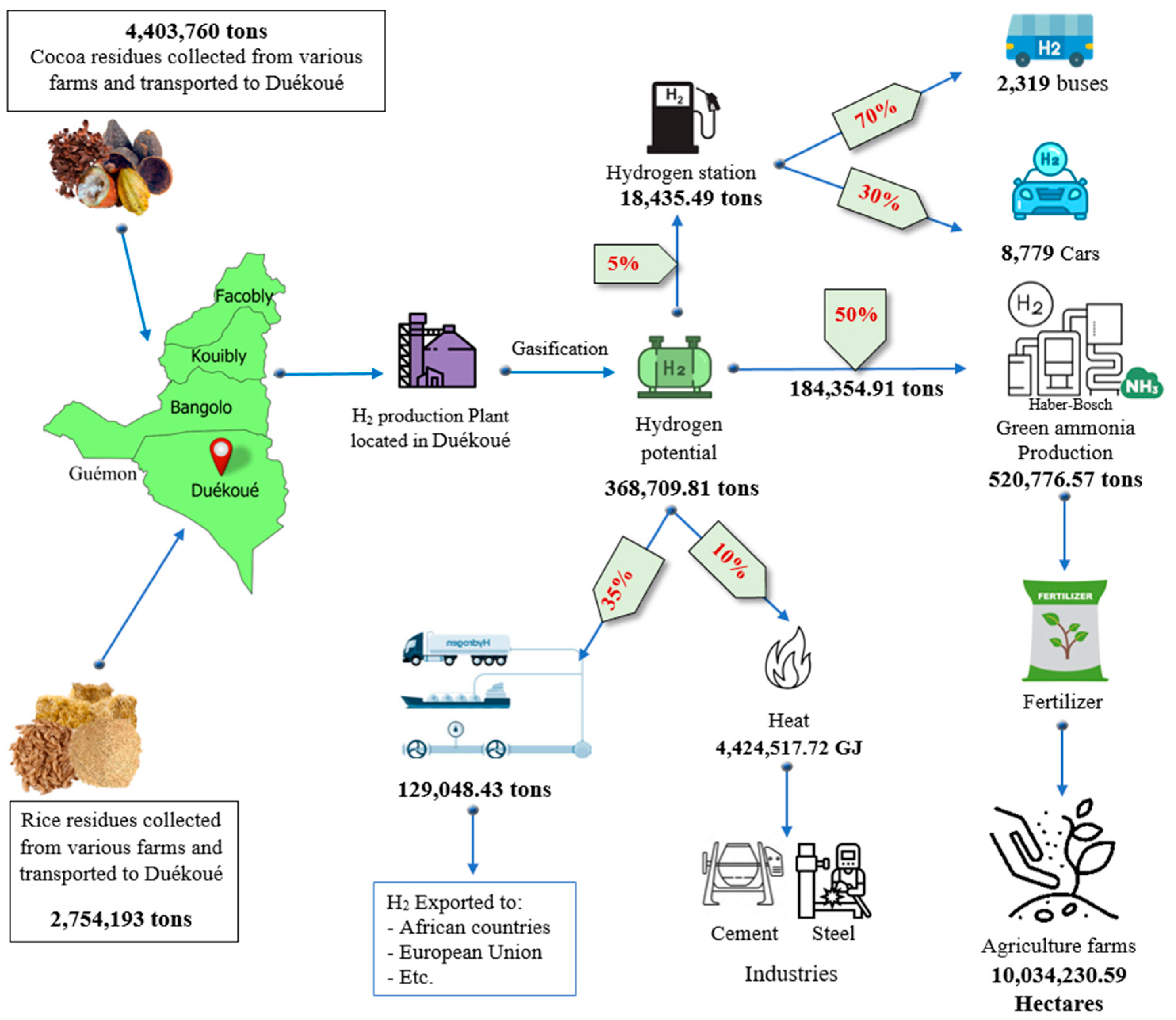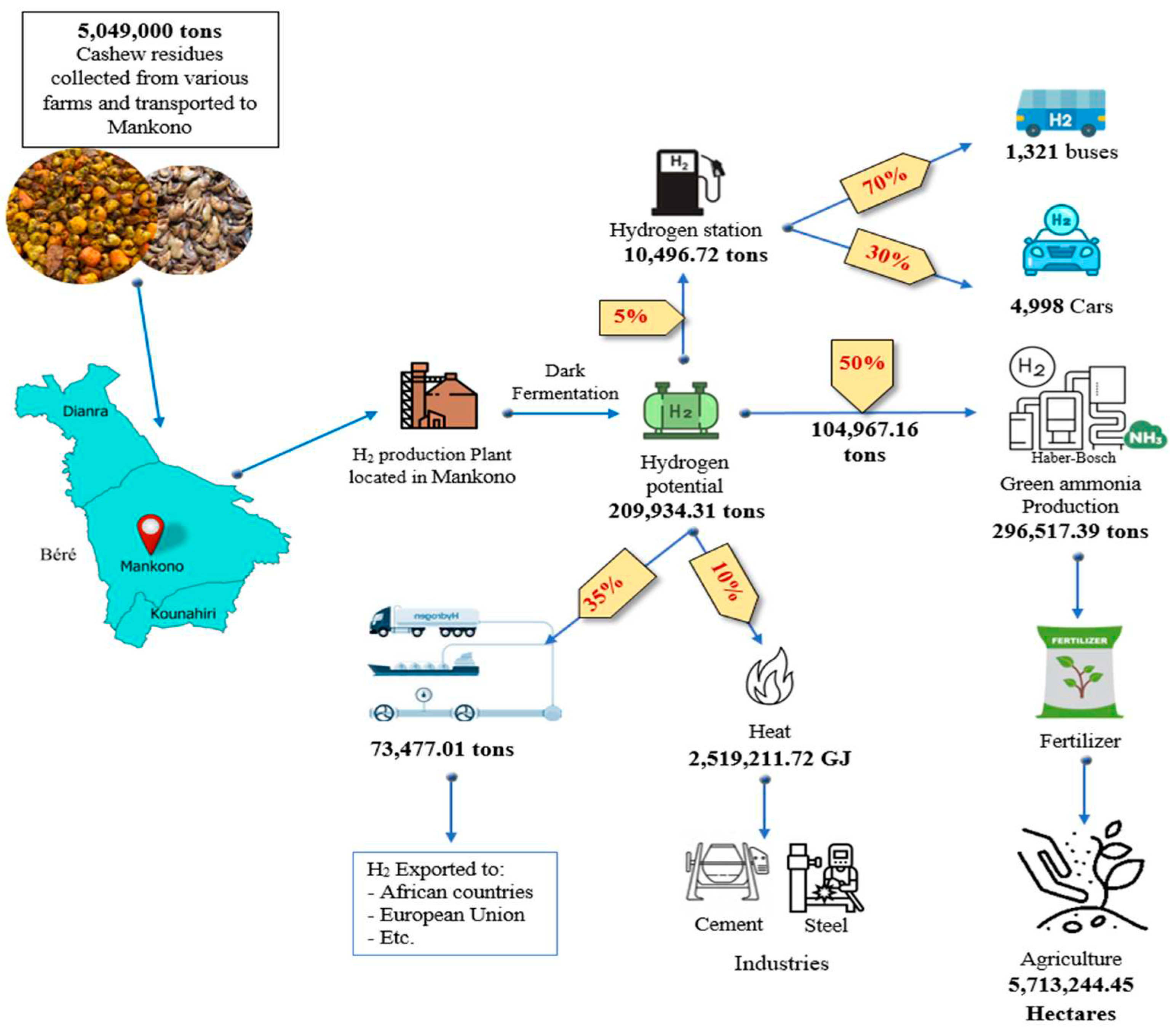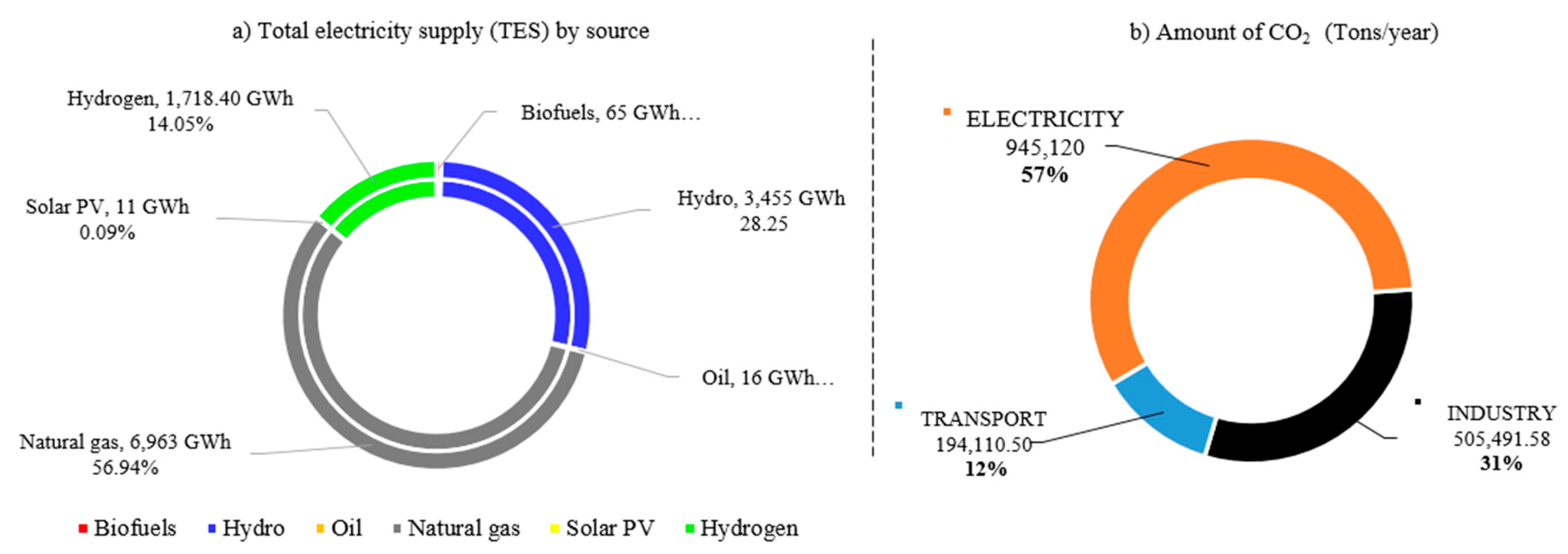1. Introduction
Energy contributes significantly to sustainable development and it is indispensable for humans. It is involved in almost all sectors of activity such as infrastructure, agriculture, livelihoods, and the environment. The energy stimulates the development of nations and increases economic security. The global energy demand is rapidly increasing and the energy consumption is heavily governed by the use of fossil fuels such as oil, coal, natural gas, etc. [
1]. These primary sources of energy are depleting due to their constant exploitations. In addition, their utilization has dramatically changed the climate pattern leading to global warming that has a negative impact on Earth’s planet. In fact, along the value chain of fossil fuels, from extraction to end use, there is a considerable stock of greenhouse gas emissions into the atmosphere. To date, frequent floods, droughts, heatwaves, severe hurricanes, and rising sea levels are increasing public health risks, water crises, food insecurity, perturbation in natural ecosystems, and displacement of people, etc. [
2]. Climate change is an issue for all the nations in the world and severely affects the environment, society, and worldwide economy [
3,
4,
5].
The need for innovative, clean, affordable, and reliable energy sources in the global energy system is alarming. In 2015 at the Conference of the Parties (COP21) in Paris, 194 countries decided to tackle climate change by limiting global warming to 1.5 °C [
6]. Thus, renewable energy has become an important subject of discussion in the energy sector nowadays. Biomass is abundant, renewable, and environmentally friendly source. It is defined as the fraction of biodegradable products, waste, and residues from agriculture, plants, animal substances, households, industries etc. [
7]. The conversion of biomass into hydrogen can be done through biological or thermochemical processes.
Côte d’Ivoire is a country located in West Africa, between longitudes 8°30’ and 2°30’ West and latitudes 4°30’ and 10°30’ North, in the intertropical zone, it has a shape like a square whose area is estimated at 322,460 km
2 with an estimated population of 28,262,050 inhabitants. Its economy is largely based on agriculture [
8]. The country has an abundant crop residue generated from the different farms but those residues are not valorized and most are abandoned or burnt on the farm. In addition, the lack of local industries for the transformation of raw products prevents the farmers from fully processing the agricultural wastes. Addressing all these challenges is crucial to an efficient and sustainable energy plan.
This study aims to propose a strategic plan for the sustainable conversion of crop residues to hydrogen. More specifically, to assess the potential of crop residues in Côte d’Ivoire and determine the hydrogen potential of these crop residues. Furthermore, to develop scenarios based on the use of hydrogen in Côte d’Ivoire. These scenarios will consider aspects such as the production, distribution, and consumption of hydrogen. The study also analyses the impact of the scenarios. This analysis will encompass environmental, economic, and social dimensions, providing a holistic view of how the use of hydrogen from crop residues can shape Côte d’Ivoire’s energy landscape and contribute to its sustainable development.
2. Materials and Methods
2.1. Data collection
The study is carried out using existing data (secondary data). This method is efficient and reliable to the extent that it reduces time in data collection and saves costs. Existing data are extracted from the work done by [
9] and the German Agency for International Cooperation (GIZ) on the biomass potential in Côte d’Ivoire.
2.2. Data processing and analysis
The hydrogen potential of crop residues is evaluated through theoretical calculation. Various methods to theoretically estimate the hydrogen potential exist in the literature. However, in this study, gasification and dark fermentation processes are promoted. Gasification appears to be a promising technology for dry biomass and has high hydrogen content (25-30%) and conversion efficiency of up to 85% depending on the feedstock. In fact gasification is a thermochemical process that converts solid biomass into biofuels such as synthesis gas also known as syngas [
10]. In general, the biomass gasification reaction can be expressed as follows:
If the fractions of CO
2, O
2 and H
2O involved in the process are assumed to be combustion products and CH
4 in the syngas negligible. Therefore, the Equation 2 changes to:
This equation could be followed by the water-gas shift reaction to enhance the hydrogen potential in practice:
Using the simplified Equation 2, the carbon, hydrogen and oxygen contents in the crop residues collected from previous works done by [
11]. Then the equations for each feedstock are generated. Those equations are balanced, and the hydrogen potential of each crop residue is determined. These approaches are similar to those proposed by [
12] in their study. In the same way, for high moisture biomass such as cashew apples, a dark fermentation process is used to assess the hydrogen potential. [
13] Demonstrated that in general during the process, glucose (C
6H
12O
6) reacts with water (H
2O) to yield acetic acid (CH
3COOH), carbon dioxide (CO
2) and hydrogen (H
2). Applying this reaction and the percentage of carbon, hydrogen, and oxygen present in the cashew apple, the theoretical hydrogen potential of the cashew apple is determined. Furthermore, the scenarios are based on hypothetical calculations. The following Equation 4 is used to estimate the heat potential:
With 120 MJ/kg the Lower Heating value of hydrogen on a mass basis. In addition, the electrical potential is given by Equation 5:
33 kWh/kg is the amount of electricity that can be generated from 1kg of hydrogen using a fuel cell [
14]. To find the number of vehicles, [
15], [
16] Demonstrated that 1kg of hydrogen can run a fuel cell electric vehicle (FCEV) up to 60 miles (96.56 km) for cars and 10.19 miles (16.4 km) for buses. The fuel cell efficiency considered here is 60%. Therefore, based on these data, it is assumed that the average daily kilometers of cars and buses in Côte d’Ivoire are approximately 100 km and 150 km respectively. Equation 6 below expresses the number of cars and buses in the scenarios:
Moreover, the Haber-Bosch process with 50% efficiency is used to obtain the green ammonia (NH
3) potential. In presence of an iron catalyzer and under exothermic reaction (- 92.4 kJ/mol) nitrogen captured from the air and hydrogen react at high temperature (300–500 °C) and pressure (140–250 bar) to yield ammonia.
According to [
17], 177 kg of H
2 and 823 kg of N
2 are theoretically necessary to produce 1 ton of ammonia. Assuming that the potential of hydrogen was fossil energy, the carbon dioxide that could be emitted is calculated using the IPCC method. This method is also used by [
18] in their study. The CO
2 reduction can be estimated using the equation 8 below.
3. Results
3.1. The potential of crops residues in Côte d’Ivoire
Côte d’Ivoire has achieved world records in agriculture thanks to its strong agricultural diversity. It is the world’s largest producer of cocoa and cashew nuts, and the world’s fifth-largest palm oil producer, becoming the second-largest African producer. In addition, statistics have shown that the country is the seventh largest producer of natural rubber in the world, which results into the number one African producer. According to Organization for Economic Co-operation and Development [
19], Côte d’Ivoire is the fourth African cotton producer and has significant amount of crop residues. Figure below shows a picture of some byproducts from the agricultural sector in Côte d’Ivoire.
Figure 1.
Picture of some crop residues in Côte d’Ivoire.
Figure 1.
Picture of some crop residues in Côte d’Ivoire.
The total amount of crop residues is evaluated at 16,801,306 tons. The cocoa sector has a huge potential for residues. The production of Cocoa is estimated at 2.18 million tons in 2019-2020. As a result, Côte d’Ivoire generated approximately 15 million tons of wet pod equivalent to 4.36 million tons of dry pod residues, an equivalent of 26.21% of all the crop residues considered in this study. Apart from cocoa pods, there was a certain amount of cocoa shells (43,760 tons) available in a few small local industries [
20]. Regarding cashews, several residues are also generated from this sector. The apple is unquestionably the greatest portion of the fruit in terms of volume and mass. Approximately 80% of the weight of the whole fruit is made up of the cashew apple. In 2019, the amount of cashew residues was estimated at 5,049,000 tons including its apples with 5,000,000 tons and shells (49,000 tons) accounting for 30.05% of all residues. These values have widely increased to an outstanding record. For instance, in 2022 alone, 1,028,172 tons of cashew nuts were recorded and [
21] have shown that cashew apples account for 9 to 10 times the weight of nuts. This means that about 9 to 10 million tons of cashew apples have been generated.
Rice straw amounted to 2,118,610 tons in addition to its husks and brans which were about 423,722 tons and 211, 861 tons respectively. It represents about 16.39% of all residues. Oil palm has residues like palm empty bunches accounted for 1,542,000 tons or 9.18% of the total residues. Cotton residues are estimated at 900,000 tons (5.36%). Residues like sugarcane 740,000 tons (4.40%), cassava 588,000 tons (3.50%), and maize 480,000 tons (2.86%) are small compared to other types of residues. These residues are low because they are partly used for direct combustion or animal feed (mainly cassava). Conversely, coffee, mango, and natural rubber have very low residues and are rated at 146,353 tons (0.87%), 133,000 tons (0.79%), and 65,000 tons (0.39%) respectively. These small quantities of residues are explained by the fact that these crops are only specifically grown in certain regions. They also produce relatively less residue in their treatment. The diagram below (Figure 2) shows the share of crop residues in 2019.
Figure 2.
The share of various crop residues in Côte d’Ivoire in 2019.
Figure 2.
The share of various crop residues in Côte d’Ivoire in 2019.
3.2. Hydrogen potential
The various types of crop residues used in the study present huge hydrogen potential estimated at 1,296,424.84 tons. Cashew apple has the greatest hydrogen potential, amounting to 294,240.84 tons. This is mainly because of the abundance of underutilized cashew apples in Côte d’Ivoire, coupled with the increase of cashew nut farms in recent years. The amount of cocoa pod husks has 281,858.59 tons of hydrogen. However, the hydrogen potential of their shells, namely the cashew nutshell and the cocoa bean shell, is substantially lower. This can be attributed to the country’s predominant practice of exporting crop products rather than processing them locally. The hydrogen potential of rice straw is 222,552.24 tons. This is slightly closer to that of cocoa pod husks and higher than palm oil empty fruit bunches, which amount to 187,179.19 tons. Furthermore, cotton stalks have a sizeable hydrogen potential of 96,566.52 tons. Notwithstanding, cassava peels, sugarcane bagasse, and maize stalks contribute to the overall potential of hydrogen, offering 60,786.08 tons, 53,586.84 tons, and 32,997.99 tons respectively. Despite their small quantities, these crop residues remain valuable and can be used effectively. On the other hand, certain residues such as sugarcane molasses, mango peels and seeds, maize cobs, rice bran, coffee grounds and husks, and rubber seeds exhibit a much lower potential of hydrogen. This can be attributed to the fact that initially, the residues were limited in quantity, which consequently affected their hydrogen potential.
Considering a conversion efficiency of 70% for both gasification and dark fermentation [
22], the total technical hydrogen potential becomes 907,497.39 tons. This technical hydrogen potential is more implementable compared to the theoretical potential. Meanwhile, in real life, it could be reduced due to certain operating conditions, parameters, and losses during the process. Figure shows the theoretical and technical hydrogen potential of each crop residue.
Figure 3.
Technical and theoretical hydrogen potential from crop residues (Tons).
Figure 3.
Technical and theoretical hydrogen potential from crop residues (Tons).
4. Discussion
4.1. Strategy for crop residue management
Currently, Côte d’Ivoire lacks an effective framework for managing crop leftovers. Several barriers are preventing efficient waste management, and these include the inadequate stakeholder participation, insufficient research on farm waste management, absence of appropriate residues disposal sites, and a scarcity of knowledge and labor. To overcome these problems and enable the hydrogen-producing sectors to operate effectively at the time of implementation, different stages are involved.
4.1.1. Stage 1: Stakeholder Engagement
The participation of various stakeholders such as rural communities, farmers, crop residues processing industries, research institutions, the Ministry of Agriculture and Rural Development and the Ministry of Environment and Sustainable Development, and private sectors is essential. To effectively manage agricultural residues through an appropriate collection approach, all parties need to work together to emphasize the importance of adopting best practices. To guarantee stakeholders’ meaningful engagement, communication channels must be established. Online platforms, surveys, forums, seminars, awareness campaigns, one-on-one meetings with farmers, radio and television advertisements, and leveraging the influence of social media for information dissemination are examples of these channels. However, delegates should personally meet peasants in distant places where they lack regular access to communication tools such as the internet and smartphones to promote awareness and provide required communication facilities. This inclusive and transparent approach will promote collective accountability and active participation of all stakeholders. It is also critical to encourage teamwork and build partnerships. Subsidies, including financial and technical support, should be made available to farmers and private organizations participating in residue management projects.
4.1.2. Stage 2: Education and Training
To overcome the lack of information amongst the vast majority of farmers, farmer education and training programs focused on proper crop waste handling and collecting procedures, as well as the numerous advantages of residue collection, are vital. These programs should attempt to provide information on appropriate residue separation and packing processes to assure the quality and viability of the collected residues. It is critical that trained persons (famers, group of people, etc.) can also train other new people. The creation of mobile software applications that incorporate local dialects and French is critical to improving accessibility and convenience. These programs would allow farmers to attend crop residues management courses on their smartphones at any time and from any location. Furthermore, to effectively reach a large audience, it is important to broadcast television programs on waste management in both the French language and local dialects. These programs should be hosted by specialists in the field. Farmers should also be encouraged to learn how to use digital technologies such as drones, FarmLogs, ArcGIS, and QGIS. In reality, these can assist farmers in tracking and mapping agricultural waste generation, storage, and disposal sites.
4.1.3. Stage 3: Development of the system for collecting, storing, and transporting crop residues
The strategic location of an appropriate number of collection points near agricultural areas in some regions of Côte d’Ivoire will allow farmers to easily access these facilities to deposit crop residues. To prevent hazardous effects, appropriate collection equipment, such as personal protection equipment must be provided. In addition, collections machines such as balers and forage harvesters, are needed to efficiently gather and process crop residues. These machines are capable of cutting, shredding, and baling the residues into manageable sizes, facilitating easier storage and transport. The construction of suitable storage facilities that cater to the different types of crop residues on the storage site is necessary. These storage facilities should be designed to maintain the quality of the residues. Additionally, adequate ventilation, moisture control mechanisms, and fire prevention measures must be taken into account during the construction. After collecting and gathering the residues, a transportation system that effectively transports the crop residues from the collection point to the designated hydrogen plants must be established. It should be very well designed to minimize transportation time and costs. Equipment such as loaders, conveyors, or trailers should be employed to safely and efficiently load, unload, and transport the residues from the field to storage facilities or hydrogen production sites.
4.1.4. Stage 4: Strategy for capacity building
The development of capacity in the hydrogen field will address the lack of expertise and manpower in Côte d’Ivoire. First, to achieve this, it is essential to promote awareness of the potential of hydrogen as an alternative energy carrier through seminars, workshops, and public campaigns. The public, educational institutions, NGOs, and industries must be mobilized to understand the importance of hydrogen and its applications. The institutions to target are high schools, colleges, universities, and energy companies. After this great awareness, the Hydrogen Research and Development Centre must be established. This Centre should collaborate with universities such as Félix Houphouet-Boigny University in Abidjan, the University of Man, and many other universities. The Yamoussoukro Engineering School, which is quite implicated in scientific research and trains the country’s elites, must be strongly involved. This will indeed encourage the development of hydrogen technologies. This Centre must also offer training programs, and internships. By bridging the gap between academia and practical applications, industry experts can offer real-world insights and advice to students and researchers. Moreover, to facilitate the development of hydrogen, the universities mentioned must integrate a specialized hydrogen track in their programs. This ensures that students receive comprehensive education and specific training on hydrogen technologies. The program should include courses on hydrogen production, storage, transportation, use and safety, etc. In addition, partnerships should be established between Ivorian universities and reputable institutions abroad such as European, American, and Asian universities and industries that have expertise in hydrogen technologies. This collaboration will boost knowledge transfer and joint research projects. It will expose students and researchers to international best practices and cutting-edge advances in the field. More importantly, the government must provide scholarships or funding opportunities for deserving students to pursue graduate studies or research in hydrogen-related disciplines abroad. This investment in human capacity allows students to acquire in-depth knowledge and practical experience, which they can bring back to contribute to the development of the hydrogen sector in Côte d’Ivoire (see Figure).
Figure 4.
Different steps for capacity building.
Figure 4.
Different steps for capacity building.
4.2. Scenarios based on hydrogen development in Côte d’Ivoire
Scenarios are data-driven cases that help understand the implementation aspect. Here, three different scenarios are explored, each considering the entire process from hydrogen production to its end use in Côte d’Ivoire. The transport, industrial, agricultural, and electricity generation sectors are specifically considered in these scenarios. The allocation of hydrogen is determined based on product consumption, be it energy or chemical fertilizer.
4.2.1. Scenario A
In this first scenario, 1,542,000 tons of palm oil residues and 588,000 tons of cassava residues are collected from various farms and transported to Aboisso in the Sud Comoé region where the hydrogen plant is assumed to be located. Through the gasification process, 173,575.50 tons of hydrogen will be generated. Regarding the transport sector, the 5 percent give 8,678.78 tons of hydrogen that will be used in hydrogen station to power 1,092 buses and 4,133 cars. Despite this low percentage (5% of total hydrogen), the expected hydrogen cars and buses are considerable. On the other hand, the electricity sector receiving 50 percent (86,787.75 tons) of available hydrogen is supposed to supply 5,727,992 local and urban communities with 1,718.40 gigawatt-hours over a year. This means that non-electrified areas in the country will have access to electricity. Furthermore, the heat that can be generated from 10 percent of hydrogen to power industries is 2,082,906 gigajoules. Therefore, contributing to the decarbonization of industrial sectors in Côte d’Ivoire. European nations and some African countries, which currently rely on Russian gas and are grappling with acute shortages stemming from the devastating conflict between Russia and Ukraine. Consequently, the exportation of 35 percent of the total hydrogen, encompassing an impressive 60,751.43 tons, would not only serve to ameliorate this energy crisis but concurrently contribute to the substantial growth of Côte d’Ivoire’s gross domestic product (GDP). The actual process of hydrogen exportation can be effectively executed via the employment of various means, such as ships, pipelines, or extensive vehicular transport. A visual depiction of the scenario is provided in the Figure below.
Figure 5.
Schematic diagram of different steps of scenario A.
Figure 5.
Schematic diagram of different steps of scenario A.
4.2.2. Scenario B
For this scenario, a substantial quantity of 4,403,760 tons of cocoa residues and 2,754,193 tons of rice residues are procured from diverse agricultural farms and subsequently conveyed to Duékoué, a town situated within the Guémon region, which is the designated site for the hydrogen production. The application of the gasification process facilitates the generation of an impressive 368,709.81 tons of hydrogen which is twice as high as the first scenario. With a specific focus on the transportation sector, a mere 5 percent of this hydrogen abundance effectively energizes a fleet of 2,319 buses and 8,779 cars. On the flip side, in terms of fertilizer provision, a significant portion of the hydrogen resources, specifically 50 percent amounting to 184,354.91 tons, is allocated to the agricultural sector. This allocation can provide a remarkable 520,776.57 tons of green ammonia that has the potential to greatly benefit a large number of farms. Taking into account the consumption of fertilizers per unit of arable land (51.9 kg/hectare) in 2020, an estimated 10,034,230.59 hectares can have access. Therefore, this could reduce Côte d’Ivoire’s dependence on imported chemical fertilizers from Russia, Morocco etc. In addition, Côte d’Ivoire could become a fertilizer exporter nation in Africa. Heat, up to 4,424,517.72 gigajoules from 10 percent of hydrogen can be used in the industrial sector. Heat is an essential form of energy used in various industrial processes, such as manufacturing and refining. The availability of such an important heat source can provide numerous benefits to industries, including increased productivity, increased efficiency, and reduced reliance on conventional energy sources. The amount of hydrogen that could be exported is 129,048.43 tons to the international market. It is a significant quantity that can replace a large bulk of fossil energy. Hydrogen has gained attention as a clean and versatile energy carrier with various applications, including transportation, power generation, and industrial processes in European nations. The exportation of such a considerable quantity of hydrogen would enhance the energy transition. This particular scenario is the most promising.
Figure 6.
Schematic diagram of different steps of scenario B.
Figure 6.
Schematic diagram of different steps of scenario B.
4.2.3. Scenario C
Besides the two situations aforementioned, this scenario focuses on the use of wet biomass, particularly cashew apples. The suitable conversion method is the dark fermentation process. It is planned to establish a hydrogen factory near the farms in Mankono, located in the region of Béré, in the north of the country. Approximately 5,049,000 tons of cashew nut residues will be transported from agricultural fields and local industries to the plant, as cashew apples are subject to rapid decomposition. Technically, this process has the potential to produce 209,934.31 tons of hydrogen. Such an amount of hydrogen (50 percent) could provide 296,517.39 tons of green ammonia fertilizer and supply 5,713,244.45 hectares of arable land. Thereby, adding it to the second scenario will increase the fertilizer supply to 817,293.95 tons per year supplying a considerable arable land of 15,747,475.04 hectares. Fertilization improves plant nutrition, promotes plant growth, improves crop quality, and ultimately maintains and even enhances soil fertility. Ammonia is extremely effective in providing nitrogen to the soil to improve crop yields. Additionally, 1,321 buses and 4,998 cars could benefit from 10,496.72 tons of hydrogen. In terms of heat supply, approximately 2,519,211.72 gigajoules could be obtained from the 10 percent hydrogen dedicated to the industrial sector. Moreover, under this scenario, a maximum of 73,477.01 tons of hydrogen can be exported to the international market. It is important to note that while these scenarios hold great opportunities, their implementation would require careful planning, coordination, and investment in infrastructure and technology. Considerations should include hydrogen, storage, safety measures, and market demand. Furthermore, environmental considerations and sustainability practices should be incorporated for long-term sustainability and positive impact.
Figure 7.
Schematic diagram of different steps of scenario C.
Figure 7.
Schematic diagram of different steps of scenario C.
4.3. Impact of the scenarios
The three scenarios have a positive impact on the environment, the economy, and society. In Côte d’Ivoire most of the vehicles are older than 10 years therefore, enhancing greenhouse gas emissions and increasing air pollution because of the incomplete burnt fuel [
23]. Assuming the amount of hydrogen to be equivalence of gasoline (1kg H
2 equal to 2.8kg Gasoline) for small vehicles and diesel (1kg H
2 equal to 2.79 kg Diesel) for buses [
24], an overall 194,110.50 tons of CO
2, emission could be reduced yearly. Specifically, scenarios (A, B, C) can reduce 44,794.47 tons of CO
2, 95,133.56 tons of CO
2 and 54,182.46 tons of CO
2 respectively. As a result, that will decarbonize the transport sector up to 12%. Hence, resulting in climate change mitigation, the improvement of air quality, public health enhancement and environmental benefits. On the other hand, the emission of CO
2 in the electricity sector will be greatly reduced. The first scenario which provide 50 percent of total hydrogen produced will have a CO
2 reduction of 945,120 tons per year. Thus, contributing 57% of decarbonization. This will not only reduce dependence on fossil fuels, but also boost the integration of renewable energies to 42.92%. As a result, this will increase and exceeds the government’s target of 42% renewable energy by 2030. In addition, increasing the use of hydrogen in the electricity sector will increase income while decreasing poverty and improving education, can promote sustainable development. The diagram below shows the share of electricity generation by source.
The industrial sector which represents a hard-to-debate sector is positively impacted in the three scenarios. Supplying heat from hydrogen will replace fossil energy, and indeed mitigate up to 505,491.58 tons of CO
2 emissions specifically, 116,642.74 tons, 247,772.99 tons, and 141,075.86 tons, for scenarios A, B and, C respectively. This CO
2 reduction will lead to 31% of decarbonization. Considering that Côte d’Ivoire currently emits around 14.5 million tons of CO
2, the implementation of this project would result in a substantial annual reduction of 11.34% in carbon dioxide emissions. This highlights the significant impact that these measures can have on CO
2 mitigation and the promotion of sustainable practices. On the economic aspect, the production cost of renewable hydrogen in Africa is cheaper as compared to Europe. [
25] investigated three different gasifiers for hydrogen production, namely, downdraft gasifier, circulating fluidized bed gasifier and, plasma gasifier. Their study reported production costs per unit mass of 1.16
$/kg, 3.33
$/kg and 2.45
$/kg respectively. Considering circulating fluidized bed gasifier cost, the production cost of scenarios A and B could be estimated at 578,006,415 US Dollars and 1,227,803,667 US Dollars respectively. This means that hydrogen can be produced entirely in Côte d’Ivoire if a lot of efforts are being made. Additionally, exporting hydrogen will trigger the country’s economy. More importantly, according to the Ivorian Ministry of the Economy and Finance, in 2021 the imported fertilizer cost was 107 million Euros for 357,179 tons. Compared with the green fertilizer production in the scenarios, up to 817,293.95 tons of fertilizers could be generated. While considering a local selling price (22.33 US Dollars per kilogram of fertilizer), up to 18,250,173.9 US Dollars can be earned per year. This will make the country independent of imported fertilizers and increase crop productivity. All these scenarios will provide many employment opportunities to young generation and cope with unemployment. The diagram shows the carbon that could be reduced in each sector electricity supply by source including the scenarios.
Figure 8.
a) Carbone dioxide (CO2) reduction from the scenarios; b) Total electricity supply by source including the scenarios.
Figure 8.
a) Carbone dioxide (CO2) reduction from the scenarios; b) Total electricity supply by source including the scenarios.
5. Conclusions
In this work, strategies for hydrogen development in Côte d’Ivoire are illustrated. The study focused primarily on assessing the potential of crop residues and the amount of hydrogen that can be produced. Scenarios have been developed to highlight the strategies needed to build hydrogen industries, as well as sectors that would have a high demand for hydrogen. The approach used in this study was theoretical. The results revealed that Côte d’Ivoire generated in 2019, up to 16,801,306 tons of crop residues from 11 types of crops. This considerable amount has a theoretical hydrogen potential of 1,296,424.84 tons and could technically produce up to 907,497.39 tons of hydrogen per year. To achieve this, the study emphasized on the adoption of crop waste management strategy by involving stakeholders and training farmers. Followed by a strategy for capacity building in order to have a highly skilled workforce. The three proposed scenarios demonstrated a significant impact. The Ivorian industries can be supplied with 9,026,635 gigajoules of heat. Under these scenarios, up to 17,910 cars and 4,732 buses could run on hydrogen. The agricultural sector could receive up to 817,293.95 tons of green ammonia, which can be used on 15,747,475.04 hectares of arable land. In addition, the electricity sector could be positively impacted by supplying electricity to approximately 5,727,992 households with an annual production of 1,718.40 gigawatt-hours. Thus, up to 1,644,722.08 tons of CO2 could be reduced, shared as follows: 12% in transport, 31% in industry, and 57% in the electricity sector. Added to this, there is the possibility of exporting 263,276.87 tons of hydrogen to other countries.
This research has highlighted the benefits of valorizing crop residues and demonstrated the significant impact of hydrogen in various sectors. According to the findings of this study, it can be seen that there are potential crop residues that can be converted to hydrogen, which is a promising solution for the future. However, the lack of public awareness of the use of residues, the lack of funding for the management of crop residues, the lack of government policies and regulations, etc. are major challenges. It is therefore imperative to conduct in-depth experimental studies to make these results more accessible and applicable. It is also necessary to develop a political and financial strategy to trigger the development of hydrogen in Côte d’Ivoire.
Author Contributions
Conceptualization, K.J.H.A. and S.N.; methodology, K.J.H.A. and V.S; resources, K.J.H.A., Y.N., S.N. and V.S.; writing—original draft preparation, K.J.H.A.; writing—review and editing, K.J.H.A. and Y.N; supervision, Y.N. and S.N.; project administration, Y.N. and S.N. All authors have read and agreed to the published version of the manuscript.
Funding
This research was funded by the Federal Ministry of Education and Research, Germany.
Data Availability Statement
Not applicable.
Acknowledgments
I express my gratitude and thanks to WASCAL for lunching this outstanding green hydrogen research project.
Conflicts of Interest
The authors declare no conflict of interest.
References
- IRENA. World Energy Transitions Outlook 2023: 1.5 °C Pathway, International Renewable Energy Agency, Abu Dhabi 2023. Available online: www.irena.org/publications.
- Dhakal, S., J.C. Minx, F.L. Toth, A. Abdel-Aziz, M.J. Figueroa Meza, K. Hubacek, I.G.C. Jonckheere, Yong-Gun Kim, G.F. Nemet, S. Pachauri, X.C. Tan, T. Wiedmann. Emissions Trends and Drivers. In IPCC, 2022: Climate Change 2022: Mitigation of Climate Change. Contribution of Working Group III to the Sixth Assessment Report of the Intergovernmental Panel on Climate Change. Cambridge University Press, Cambridge, UK and New York, NY, USA 2022. [CrossRef]
- Abbass, K.; Qasim, M. Z.; Song, H.; Murshed, M.; Mahmood, H.; Younis, I. A Review of the Global Climate Change Impacts, Adaptation, and Sustainable Mitigation Measures. Environ Sci Pollut Res 2022, 29, 42539–42559. [Google Scholar] [CrossRef] [PubMed]
- Feliciano, D.; Recha, J.; Ambaw, G.; MacSween, K.; Solomon, D.; Wollenberg, E. Assessment of Agricultural Emissions, Climate Change Mitigation and Adaptation Practices in Ethiopia. Climate Policy 2022, 22, 427–444. [Google Scholar] [CrossRef]
- Leal Filho, W.; Azeiteiro, U. M.; Balogun, A.-L.; Setti, A. F. F.; Mucova, S. A. R.; Ayal, D.; Totin, E.; Lydia, A. M.; Kalaba, F. K.; Oguge, N. O. The Influence of Ecosystems Services Depletion to Climate Change Adaptation Efforts in Africa. Science of The Total Environment 2021, 779, 146414. [Google Scholar] [CrossRef]
- Riester, C. M.; García, G.; Alayo, N.; Tarancón, A.; Santos, D. M. F.; Torrell, M. Business Model Development for a High-Temperature (Co-)Electrolyser System. Fuels 2022, 3, 392–407. [Google Scholar] [CrossRef]
- Kalak, T. Potential Use of Industrial Biomass Waste as a Sustainable Energy Source in the Future. Energies 2023, 16. [Google Scholar] [CrossRef]
- Kouassi, A. M.; Kouao, J.-M.; Kouakou, K. E. Caractérisation intra-annuelle de la variabilité climatique en Côte d’Ivoire. Bulletin de l’association de géographes français. Géographies 2022, 99, 289–306. [Google Scholar] [CrossRef]
- Guero, M.; Drion, B.; Karsch, P. Study of the Biomass Potential in Côte d’Ivoire; 2021. [Google Scholar]
- Maitlo, G.; Ali, I.; Mangi, K. H.; Ali, S.; Maitlo, H. A.; Unar, I. N.; Pirzada, A. M. Thermochemical Conversion of Biomass for Syngas Production: Current Status and Future Trends. Sustainability 2022, 14, 2596. [Google Scholar] [CrossRef]
- Nelson, N.; Darkwa, J.; Calautit, J.; Worall, M.; Mokaya, R.; Adjei, E.; Kemausuor, F.; Ahiekpor, J. Potential of Bioenergy in Rural Ghana. Sustainability 2021, 13, 381. [Google Scholar] [CrossRef]
- Cárdenas, R.; Alfonso-Solar, D.; Peñalvo-López, E.; Vargas-Salgado, C.; Pérez-Navarro, A.; Chiñas-Palacios, C. Potential For Hydrogen Production From Biomass Residues In The Valencian Community; 2020. [Google Scholar]
- ZAGRODNIK, R.; SEIFERT, K. Direct Fermentative Hydrogen Production from Cellulose and Starch with Mesophilic Bacterial Consortia. Pol J Microbiol 2020, 69, 109–120. [Google Scholar] [CrossRef] [PubMed]
- Joode, D.; Johan, C. An Analysis of Energy Neutral Roads: A Case Study How to Produce Electricity and Hydrogen Using Thesurface Area of the A6 Highway in the Netherlands; 2022. [Google Scholar]
- US DOE. Hydrogen’s Role in Transportation. Energy.gov. Available online: https://www.energy.gov/eere/vehicles/articles/hydrogens-role-transportation (accessed on 20 July 2023).
- Nekkers, R., Ex, F., & van Beckhoven, J. Status report 2BP .Hydrogen buses on theVeluwe 2020. Available online: https://www.h2nodes.eu/images/docs/20200416_status_verslag_2BP_Hydrogen_buses_on_the_Veluwe_Eng_.pdf.
- Rivarolo, M.; Riveros-Godoy, G.; Magistri, L.; Massardo, A. F. Clean Hydrogen and Ammonia Synthesis in Paraguay from the Itaipu 14 GW Hydroelectric Plant. ChemEngineering 2019, 3, 87. [Google Scholar] [CrossRef]
- Suryati, I.; Hijriani, A.; Indrawan, I. Estimation of Greenhouse Gas Emission from Household Activities during the COVID-19 Pandemic in Binjai City, North Sumatera. IOP Conf. Ser.: Earth Environ. Sci. 2021, 896, 012054. [Google Scholar] [CrossRef]
- OECD, F. OECD-FAO Agricultural Outlook 2022-2031; OECD-FAO Agricultural Outlook; FAO, OECD: Rome, Italy, 2022. [Google Scholar] [CrossRef]
- GIZ. Partnership Ready Côte d’Ivoire: Gestion et recyclage des déchets organiques 2020. Available online: https://www.giz.de/en/downloads/GBN_Sector%20Brief_CIV_Bioabfall_FR_Web.pdf.
- Guehi M., S.; Abdoulaye, T.; Armel F., Z.; Ahoussi P., B.; Kouamé R., N.; Naka, T.; Aka F., K.; Ahmont L. C., K.; Adama C., G. Physicochemical and Nutritional Characterization of Flours from Cashew Apple, Kent Mango Peelings and Kernel Almonds Collected in Korhogo City (Northern Ivory Coast. GSC Biol. Pharm. Sci. 2023, 22, 048–055. [Google Scholar] [CrossRef]
- Holladay, J. D.; Hu, J.; King, D. L.; Wang, Y. An Overview of Hydrogen Production Technologies. Catalysis Today 2009, 139, 244–260. [Google Scholar] [CrossRef]
- Doumbia, M.; Toure, N.; Silue, S.; Yoboue, V.; Diedhiou, A.; Hauhouot, C. Emissions from the Road Traffic of West African Cities: Assessment of Vehicle Fleet and Fuel Consumption. Energies 2018, 11, 2300. [Google Scholar] [CrossRef]
- Milojević, S. RECONSTRUCTION OF EXISTING CITY BUSES ON DIESEL FUEL FOR DRIVE ON HYDROGEN; 2016. [Google Scholar]
- Kalinci, Y.; Hepbasli, A.; Dincer, I. Exergoeconomic Analysis and Performance Assessment of Hydrogen and Power Production Using Different Gasification Systems. Fuel 2012, 102, 187–198. [Google Scholar] [CrossRef]
|
Disclaimer/Publisher’s Note: The statements, opinions and data contained in all publications are solely those of the individual author(s) and contributor(s) and not of MDPI and/or the editor(s). MDPI and/or the editor(s) disclaim responsibility for any injury to people or property resulting from any ideas, methods, instructions or products referred to in the content. |
© 2024 by the authors. Licensee MDPI, Basel, Switzerland. This article is an open access article distributed under the terms and conditions of the Creative Commons Attribution (CC BY) license (http://creativecommons.org/licenses/by/4.0/).
